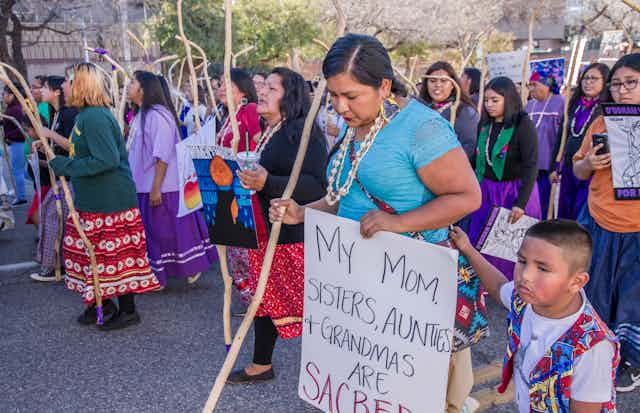Women have been working overtime during COVID-19, as care providers at home, in clinics, hospitals and other spaces. Women constitute the majority of health-care providers, both formally and informally, all over the world.
Unrecognized and ignored, the work of mothers has increased as day cares, schools and workplaces have closed, with more family members at home, increasing demands for in-home meals, care and higher needs for disinfecting.
At the same time, public health mandates to shelter-in-place have created violence traps for those who live with abusers. Male violence against women has tripled in some places during COVID-19. Family members and friends, fearing the virus, are less likely to offer shelter and other supports. So women have decreased capacity to find emergency housing, medical care and emotional assistance.
As a public health scholar, I believe it’s critical to acknowledge both the invisible and visible contributions that mothers and other women are making to public health efforts related to COVID-19 — especially as we approach Mother’s Day.
While the situation is not necessarily celebratory, it bears marking, at the very least.
Canadian feminists have a long tradition of working with international partners for women’s rights. Canada’s current feminist approach to international assistance, with its Feminist International Policy, is one worthy of further development. Created by the Trudeau government in 2017, the policy recognizes that “supporting gender equality and the empowerment of women and girls is the best way to build a more peaceful, more inclusive and more prosperous world.”
Maternal health globally
Here in Canada, government aid programs have lessened the financial burdens of the virus for many mothers. The impacts of COVID-19, however, are not equally spread among mothers, neither here in Canada nor around the globe.
Globally, the extreme measures that some nations have adopted are negatively impacting maternal mental and physical health. The list of ways in which the COVID-19 crisis has been used to veil state and corporate control is long: for example, enforcing curfews with police violence in Kenya, quarantining people in dog cages in the Philippines, granting authoritarian regimes unlimited powers in Hungary, using tracking technologies to erode human rights in Israel, weaponizing personal protective equipment by deciding who gets it along ideological lines in the United States.
Worry about uncertainties related to COVID-19 and the economy has increased rates of anxiety and depression that disproportionately impact women.
Poverty
In some lower- and middle-income countries, the secondary effects of COVID-19 may cause higher mortality than COVID-19 itself. This includes hunger, disease and violence.
Poverty is a major obstacle in achieving improved maternal health status. Now, and in non-pandemic times, poor socioeconomic conditions are responsible for key maternity-related complications such as hemorrhage, sepsis, hypertensive disorders, unsafe abortion and obstructed labour, which lead to an increase in maternal death worldwide.
These problems include inaccessible clean drinking water and sanitation facilities, inadequate calories and nutrition, poor housing conditions, illiteracy, precarious working conditions and a lack of transportation to access life-saving health care facilities and places of work.

The inability to pay for clinical care is a significant cause of maternal death in many lower- and middle-income countries where universal health care systems are not established.
Poverty contributes to delayed decisions to seek medical care, increased time to reach health care facilities, and impediments in receiving appropriate care. Eliminating poverty and increasing literacy of women in lower and middle income countries improves maternal health.
Making a difference
Canadian social justice initiatives, in support of global strong feminist movements aim to alter social structures and perceptions about women’s value and worth. The initiatives hold great promise to reduce poverty, sexism, discrimination, illiteracy and other barriers to good health.
Canadian organizations such as Maternal and Infant Health Canada collaborate with sister organizations in lower and middle income countries to strengthen women and children’s human and health rights. Working across borders like this moves us towards a better day for all mothers.
Women’s autonomy, buttressed by education and employment, contributes to achieving better general and maternal health. Improvements in women’s socioeconomic status thus decrease maternal mortality rates.

Women with more freedom access greater levels of antenatal care and opt for safe delivery care, which in turn leads to less maternal death. This begins to explain how feminist initiatives improve maternal health.
For many years, Canada has committed to spending 0.7 per cent of GDP to international development and not met this target. In 2019, the federal government devoted only 0.28 per cent of GDP to this vital form of international support.
Canada’s commitment to the allocation of 0.7 per cent of the country’s GDP to international development would help reduce maternal deaths in lower- and middle-income countries. Spending these dollars wisely will make all the difference.
Physical distancing, isolation and other measures that are in place to slow the spread of COVID-19 will necessitate the creation of new ways to honour mothers without actual hugs and breakfast in bed.
Feminist solidarity can save lives. On Mother’s Day, let’s dream about and create a more just world for all women and girls.

